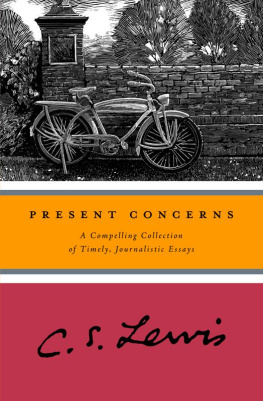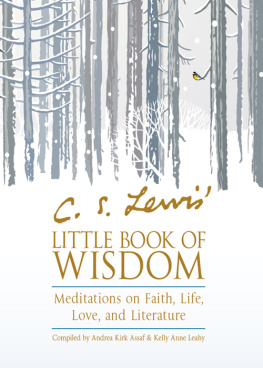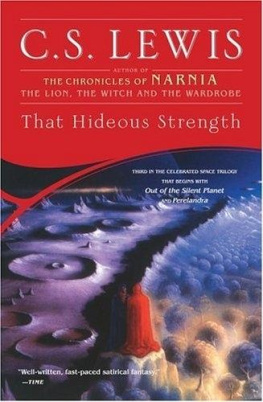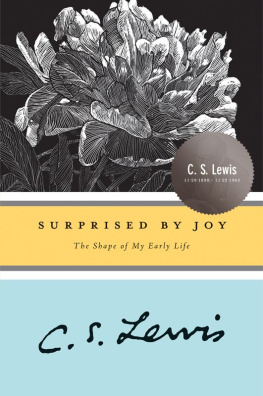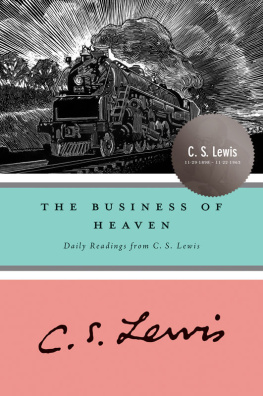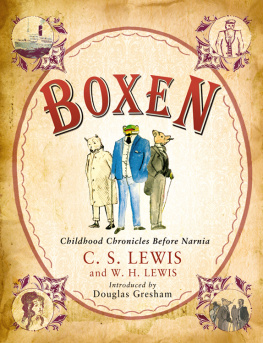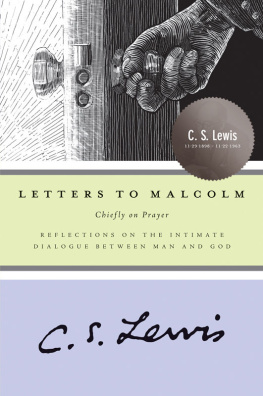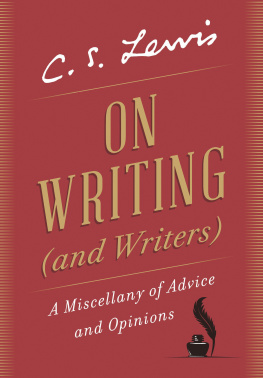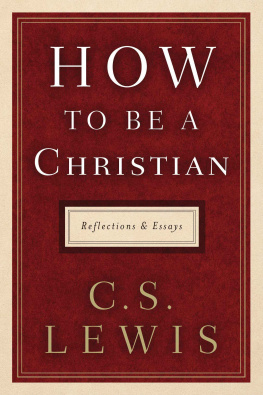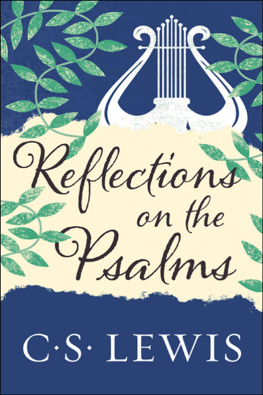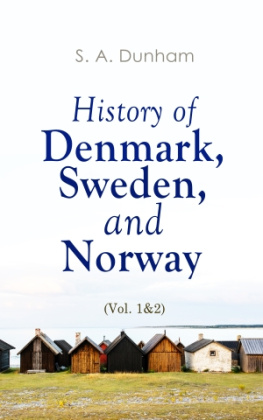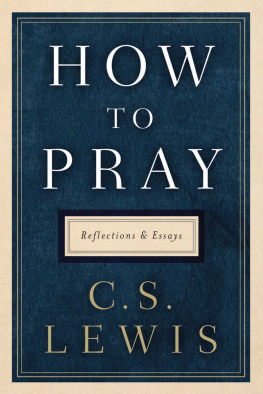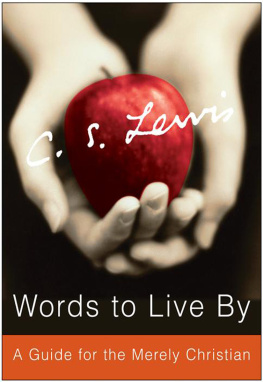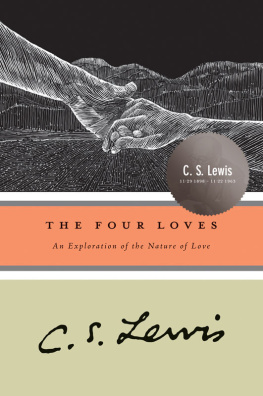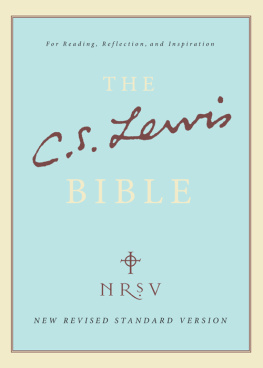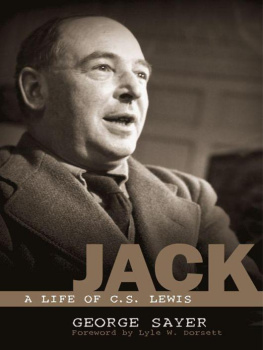
Table of Contents
First published by Fount Paperbacks, London, in 1986
Copyright 1986 by C. S. Lewis PTE Ltd
All rights reserved. No part of this publication may be reproduced or transmitted in any form or by any means, electronic or mechanical, including photocopy, recording, or any information storage and retrieval system, without permission in writing from the publisher.
For information about permission to reproduce selections from this book, write to Permissions, Houghton Mifflin Harcourt Publishing Company, 215 Park Avenue South, New York, New York 10003.
www.hmhco.com
Library of Congress Cataloguing-in-Publication Data
Lewis, C. S. (Clive Staples), 18981963.
1. Present concerns.
I. Hooper, Walter. II. Title.
PR60223.E926P74 1987 082 86-22934
ISBN 0-15-602785-2 (A Harvest book: pb.)
e ISBN 978-0-547-62794-6
v5.0215
Introduction
Who is Elizabeth Taylor? asked C. S. Lewis. He and I were talking about the difference between prettiness and beauty, and I suggested that Miss Taylor was a great beauty. If you read the newspapers, I said to Lewis, you would know who she is. Ah-h-h-h! said Lewis playfully, but that is how I keep myself unspotted from the world. He recommended that if I absolutely must read newspapers I have a frequent mouthwash with The Lord of the Rings or some other great book.
As most of those familiar with Lewiss writings will know, it was the news in newspapers that Lewis thought possibly the most phantasmal of all histories. Several times he showed me the only newspaper I remember being delivered to his house on Sundays. It belonged to his gardener, Paxford, and when Lewis and I read the headlines on that paper we hoped to goodness the news in it was phantasmal. In any event, I havent bothered much with newspapers since the brief and immensely happy period when I was living in Lewiss house. And I have tried to be faithful to his prescription regarding mouthwashes.
I do not want to give the impression that Lewis was a Pharisee. He did not condemn either those who wrote for newspapers or those who read them. Otherwise he would have had to censure himself as all but two of these essays were written for newspapers and magazines. Indeed, they provide us with the most complete picture we have of C. S. Lewis the Journalist. It was a role which suited Lewis admirably, for he possessed to an astonishing degree the gift of saying what needed to be said clearly and briefly. There is another thing which sets this book apart from his others. Most of his works are about Theology and Literature. While some of these pieces touch on those subjects, they were brought together because they are about so many other things. Their very variety helps answer the question What else was Lewis concerned about?
The tide of this book was suggested by Jeremy Dyson, President of the Oxford University C. S. Lewis Society. Mr Dyson is much younger than I, and after reading some of these essays he found Lewiss concerns very present to him. However, in writing the footnotes for the book I began to wonder how present Lewiss concerns and interests would be to most people. How many readers have heard of Colonel Blimp? Almost everyone would have known who he was when Blimpophobia was first published. In the end I found the answer very close by. I had never found out who Colonel Blimp was until I began editing the essays, but I had long known what Lewis meant by Blimpophobia. The truth is that while some of the outward clothing of the things Lewis wrote about has changed, the essentials in all these essays are as important as they always were. I shall be surprised if the essay On Living in an Atomic Age is not of greater concern today than when it first appeared.
C. S. Lewis the Journalist would not be nearly so well represented were it not for the man who introduced me to On Living in an Atomic Age. He is Gordon Wright of Pye Bridge, Derbyshire, and he wrote to me after discovering On Living in an Atomic Age and Three Kinds of Men cut out of whatever journals they had appeared in and stuck into a copy of a book by Lewis. Mr Wright came to Oxford with these treasuresboth new to me. It was not difficult to find the source of the first essay but Three Kinds of Men seemed impossible to track down. However, by following various clues provided by the war-news on the back of the cutting I eventually traced it to The Sunday Times. I am deeply indebted to Gordon Wright for his generosity. As so often, I have benefited from the willingness of my friend Owen Barfield to go over my own work. Finally, I am grateful to all those publishers who have allowed me to reprint the essays which make up this collection.
- The Necessity of Chivalry is Lewiss title for the essay published as Notes on the Way in Time and Tide, vol. XXI (17 August 1940), p. 841.
- Equality is reprinted from The Spectator, vol. CLXXI (27 August 1943), p. 192.
- Three Kinds of Men is reprinted from The Sunday Times, No. 6258 (21 March 1943), p. 2.
- My First School was Lewiss title for his Notes on the Way from Time and Tide, vol. XXIV (4 September 1943), p. 717.
- Is English Doomed? is from The Spectator, vol. CLXXII (11 February 1944), p. 121.
- Democratic Education is Lewiss title for his Notes on the Way from Time and Tide, vol. XXV (29 April 1944), pp. 36970.
- A Dream is reprinted from The Spectator, vol. CLXXIII (28 July 1944), p. 77.
- Blimpophobia is from Time and Tide, vol. XXV (9 September 1944), p. 785.
- Private Bates is reprinted from The Spectator, vol. CLXXIII (29 December 1944), p. 596.
- Hedonics comes from Time and Tide, vol. XXVI (16 June 1945), pp. 49495.
- After PriggeryWhat? is reprinted from The Spectator, vol. CLXXV (7 December 1945), p. 536.
- Modern Man and his Categories of Thought is published here for the first time. It was written at the request of Bishop Stephen Neill (18991984) for the Study Department of the World Council of Churches. The essay exists only in typescript and it is dated October 1946. At that time Bishop Neill was Secretary of the Assembly Commission II, and the two movements, Life and Work and Faith and Order, had come together to become what was formally constituted as The World Council of Churches in 1948.
- Talking about Bicycles is reprinted from Resistance (October 1946), pp. 1013.
- On Living in an Atomic Age is taken from the last issue of the annual magazine Informed Reading, vol. VI [1948], pp. 7884.
- The Empty Universe is my title for Lewiss Preface to D. E. Hardings The Hierarchy of Heaven and Earth: A New Diagram of Man in the Universe (London: Faber and Faber, 1952).
- Prudery and Philology is reprinted from The Spectator, vol. CXCIV (21 January 1955), pp. 6364.
- Interim Report is reprinted from The Cambridge Review, vol. LXXVII (21 April 1956), pp. 46871.
- Is History Bunk? is also reprinted from The Cambridge Review, vol. LXXVIII (1 June 1957), pp. 647, 649.
- Sex in Literature is reprinted from The Sunday Telegraph, No. 87 (30 September 1962), p. 8. Introducing the essay was this note from the publishers: We are facing a crisis in morals, and nowhere is this more apparent than in the treatment by novelists of sex. Ought we not to recognize that literature, while we hope it may do good, in fact often does harm? Do not those modern novels that takeadmittedly sometimes with high artistic motivesabnormal sexual behaviour for their theme, popularize and make fashionable and permissible the abnormal sexual behaviour of their characters?...We have invited Dr C. S. Lewis as a critic, a novelist and a Christian apologist to give us his views on this matter, addressing himself to the further question of what in all this should be the attitude of the law. Here is his article.
Next page
